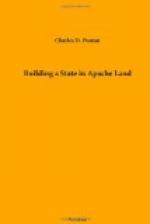I had a stalwart native of Bohemia in the company who was considered very brave; but when the attack was imminent he was a little slow in coming forward, and I cried out somewhat angrily, “Anton, why don’t you come out?”
He replied, “Wait till I light my pipe.” And that Dutchman stalked out with a rifle in his hand, two pistols on his sides, and a great German pipe in his mouth.
The Apaches did not trouble us any more, and after crossing high mountains and wide valleys we arrived on the Santa Cruz River, and camped at the old Mission Church of San Xavier del Bac.
Three leagues north of the Mission Church of San Xavier del Bac (Bac means water) is located the ancient and honorable pueblo of Tucson. This is the most ancient pueblo in Arizona, and is first mentioned in Spanish history in the narrative of Castaneda, in 1540. The Spanish expedition of Coronado in search of gold stopped here awhile, and washed some gold from the sands of the Canon del Oro on sheep skins. It is well known that that expedition drove sheep. The Spaniards, from this experience, remembering the island of Colchis, named the place Tucson,—Jason in Spanish. The “ancient and honorable pueblo” has borne this name ever since, without profound knowledge of its origin.
The patron saint of Tucson is San Augustine, and as it was now the last of August the fiesta in honor of her patron saint was being celebrated.
As we had a long march and a dry time, the animals were sent out to graze in charge of the Papago Indians living around the Missions; two weeks’ furlough was given the men to attend the fiesta, confess their sins, and get acquainted with the Mexican senoritas, who flocked there in great numbers from the adjoining State of Sonora.
Music and revelry were continued day and night, with very few interruptions by violence. The only disorder that I observed was caused by a quarrel among some Americans, and the use of the infernal revolver. There were not more than a dozen Americans in the pueblo of Tucson when we arrived, and they were not Methodist preachers. The town has grown with the country, and now contains a population of nearly ten thousand people, of many shades of color and many nationalities.
The first question to be settled was the location of a headquarters for the company. We had come a long way, at considerable risk and expense, and fortunately without disaster. We were now encamped in view of the scene of our future operations, and the exploration and settlement of a territory of considerably over a hundred thousand square miles was before us, and the destiny of a new State was in embryo. It would not be prudent to expose the lives of the men and valuable property we had hauled so far to the cupidity of the natives; and therefore a safe place for storage and for defense was the first necessity in selecting a headquarters. We had some hundred and fifty horses and mules, wagons, ambulances, arms, provisions, merchandise, mining, material,—and moreover, what we considered of inestimable value, the future,—in our keeping, and a proper location was a grave consideration.




